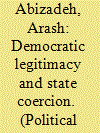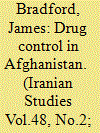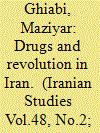| Srl | Item |
| 1 |
ID:
093581


|
|
|
| 2 |
ID:
137174


|
|
|
|
|
| Summary/Abstract |
This article explores the process leading to the Afghan government's decision to implement a prohibition and eradication of opium in the northeastern province of Badakhshan. It explores why Daud chose Badakhshan, the impact of the opium ban on the people of Badakhshan and the future of opium production and trade, as well as the evolution of drug control in Afghanistan under the Musahiban dynasty. Ultimately, the ban was launched because it allowed Daud to garner international praise and financial support, while enforcing eradication in an area inhabited by ethnic minorities ensured that the Afghan government's coercive strategy would not generate resistance from rural Pashtun tribes historically opposed to these types of state intervention.
|
|
|
|
|
|
|
|
|
|
|
|
|
|
|
|
| 3 |
ID:
137171


|
|
|
|
|
| Summary/Abstract |
On 27 June 1979, Ayatollah Khomeini declared, ‘drugs are prohibited” and their trafficking, consumption and “promotion” were against the rules of Islam and could not take place in the Islamic Republic. This ruling, although informal in nature, sanctioned a swift re-direction of Iran's previous approach to narcotic drugs, both in terms of production and consumption. As had happened in 1955, Iran seemed ready to go back to a policy of total prohibition and eradication of opiates, this time under the banner of Islam rather than that of the international drug control regime. Drugs and the politics surrounding them have been a crucial, yet neglected, aspect of the history of modern Iran that have changed the nature of the state bolstering its capacity of social intervention, while hindering its legitimacy, in the Pahlavi, as in the republican, era. By moving on “from the analysis of the state to a concern with the actualities of social subordination”, this article attempts to interpret how social subordination and state coercion were practiced and defied in the making of punishment and welfare in the social body of Iran.
|
|
|
|
|
|
|
|
|
|
|
|
|
|
|
|
| 4 |
ID:
143162


|
|
|
| 5 |
ID:
161312


|
|
|
|
|
| Summary/Abstract |
Using violence or threat of violence, “thugs-for-hire” (TFH) is a form of privatized coercion that helps states subjugate a recalcitrant population. I lay out three scope conditions under which TFH is the preferred strategy: when state actions are illegal or policies are unpopular; when evasion of state responsibility is highly desirable; and when states are weak in their capacity or are less strong than their societies. Weak states relative to strong ones are more likely to deploy TFH, mostly for the purpose of bolstering their coercive capacity; strong states use TFH for evasion of responsibility. Yet the state-TFH relationship is functional only if the state is able to maintain the upper hand over the violent agents. Focusing on China, a seemingly paradoxical case due to its traditional perception of being a strong state, I examine how local states frequently deploy TFH to evict homeowners, enforce the one-child policy, collect exorbitant exactions, and deal with petitioners and protestors. However, the increasing prevalence of “local mafia states” suggests that some of the thuggish groups have grown to usurp local governments’ autonomy. This points to the cost of relying upon TFH as a repressive strategy.
|
|
|
|
|
|
|
|
|
|
|
|
|
|
|
|